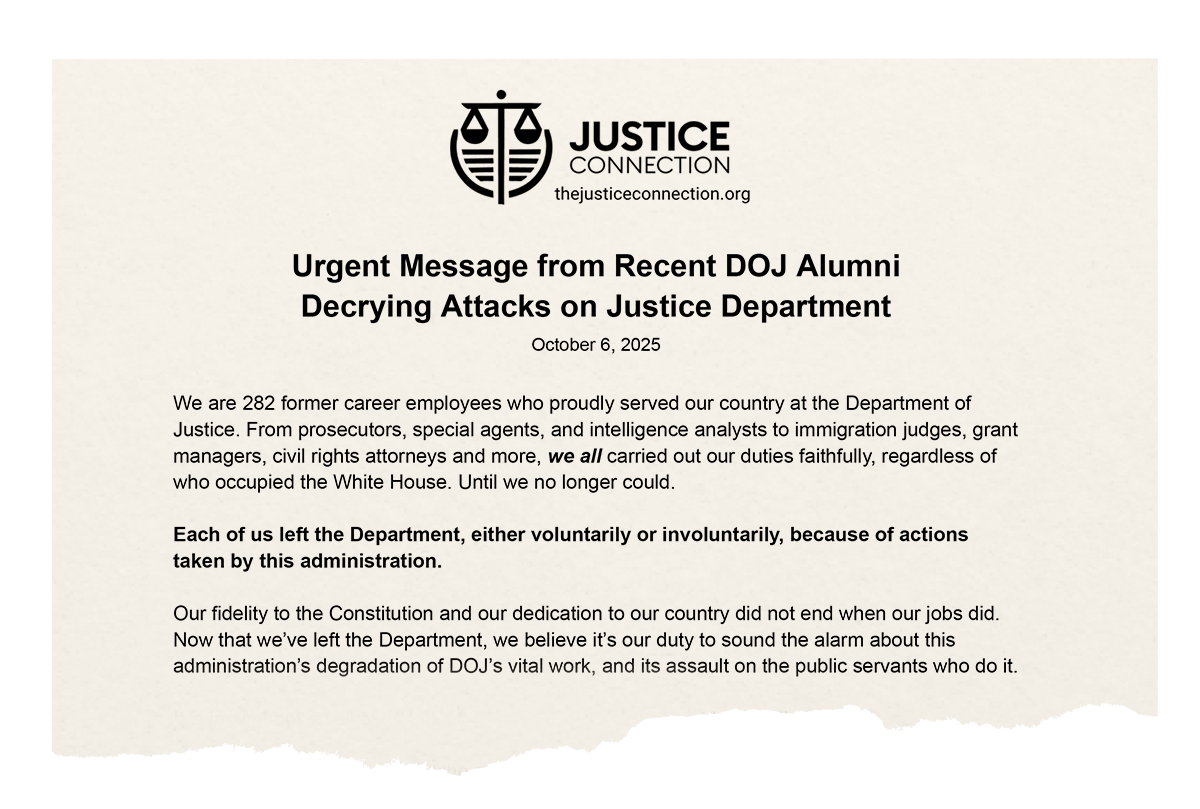Thousands of years of law enforcement experience — lost
The Justice Department’s 'second risk'
Read this letter.
It was written by about 300 nonpartisan career civil servants at the Department of Justice who left their jobs this year — in their words, “voluntarily or involuntarily, because of actions taken by this administration.”
The letter is an artifact of a remarkable moment in history. Hundreds of people who spent years, often their entire careers, working faithfully and largely anonymously in nonpartisan law enforcement were compelled not just to leave federal service but also to break their silence. To raise the alarm about the “destruction” of the Department of Justice. That’s how bad things have become. As they write:
We call on all Americans – whose safety, prosperity, and rights depend on a strong DOJ — to speak out against its destruction. Our democracy is only as strong as the rule of law, and the rule of law can’t survive without the principal institution that enforces it.
Not mincing words.
Many lifetimes of law enforcement experience obliterated in less than a year
After you read the letter, flip through the 14 pages of signatories.
Look at who signed.
Look at their roles.
Look at how long they were in them.
The average tenure for signatories — before they were forced out by the Trump administration — was over a decade. That means the vast majority worked under both Republican and Democratic presidents. They were senior trial attorneys and branch chiefs and immigration judges and prosecutors and policy analysts. They weren’t public figures or household names, by and large. They were just some of the many public servants spending years and years in the often thankless work of enforcing the rule of law for the American people.
All told, the signatories on that letter alone had approximately 3,000 years of experience at the Department of Justice.
All of that professional experience, all of that human capital, was wiped out as President Trump, Attorney General Pam Bondi, and FBI Director Kash Patel attempted to turn the Department of Justice into a personalist tool of retaliation. In attempting to reforge the scales of justice into a sword of politics, they cut loose legions of skilled professionals devoted to maintaining the former.
That’s only a small fraction of what we’ve lost
Since January, over 5,000 civil servants at the Department of Justice have resigned or been forced out. That amounts to literally tens of thousands of years of collective law enforcement experience.
Gone.
The ‘second risk’ to the Department of Justice
Since Trump returned to the White House, the Department of Justice has been gravely threatened not just by one risk, but by two.
The first risk was the most obvious: The president would follow through on his longstanding quest to politicize the DOJ and turn law enforcement into a weapon against his enemies.
The second risk, however, was more subtle. In attempting to politicize the DOJ, Bondi, Trump, and Patel would eviscerate actual legitimate law enforcement. Everything from civil rights to tax evasion to corporate fraud to national security to human and drug trafficking and violent crime.
The president is succeeding in the first one.
For instance, see this letter from over a thousand former DOJ officials condemning the “unprecedented assault on the rule of law directed by President Donald Trump” that was the Comey indictment:
But the consequences of the second risk may be even more profound.
The law, like other institutions in our country, is not self-enforcing. There’s no magical system where crimes are automatically investigated, prosecuted, and punished. It takes real people working to make that happen.
For instance, because the Pentagon, the CIA, and many other national security institutions are located in Virginia, the Eastern District of Virginia (EDVA) is by default the top national security prosecutor’s office in the country. High-profile espionage, terrorism, cybersecurity, and other national security cases are generally handled by that office’s highly specialized and experienced staff.
Two weeks ago, one EDVA prosecutor — a 20-year veteran named Michael Ben’Ary — was leading many such complex cases.
Ben’Ary was fired after a pro-Trump social media commentator speculated that he had been part of EDVA’s unwillingness to manufacture a criminal case against Jim Comey.
(Ben’Ary was not even involved in the Comey case, only adding to the Watergate-scale scandal of the White House’s politicization of justice. Read more: Watergate and Teapot Dome — in broad daylight.)
As Ben’Ary wrote in a departure note taped to his door:
I am troubled that I was removed so abruptly in the middle of important work, including the prosecution of Mohammad Sharifullah, the only person to face justice in the United States for the bombing of the Abbey Gate of the Hamid Karzai International Airport. This prosecution was meant to bring justice to the 13 United States service members and scores of civilians killed and injured. While I have the utmost confidence in my co-counsel, my abrupt, apparently thoughtless removal with no period of transition will hurt this case. This example highlights the most troubling aspect of the current operations of the Department of Justice: the leadership is more concerned with punishing the President’s perceived enemies than they are with protecting our national security. Justice for Americans killed and injured by our enemies should not be contingent on what someone in the Department of Justice sees in their social media feed that day.
Emphasis mine. Read the whole note.
If you want to live in a country where terrorists and spies and tax cheats and domestic abusers and corporate fraudsters and corrupt politicians and murderers and drug traffickers and criminals of all stripes eventually see their day in court, it takes a large workforce of nonpartisan professionals to make that happen.
At least at the federal level, many of those professionals have now left the building. The “politicization of the DOJ” is increasingly also the “hollowing out of the DOJ.”
If you want to hear more from those hundreds of recently departed law enforcement professionals, they’re part of a new organization — Justice Connection, mobilizing to support the DOJ’s apolitical workforce and the democratic norms that protect us all.
They have a new Substack launched Friday. It’s similar to If you can keep it but will focus much more narrowly on the happenings at the Department of Justice from the perspective of people who worked there back when it was nonpartisan and independent.
Read more: Raising DOJ voices through Justice Connection’s Substack.
If you enjoy this newsletter, you’re almost certain to find that one useful too. Give them a follow.





Who received this letter? Has every member of Congress received it? Has it been disseminated to newspapers?
Just as I was thinking that the intentional unraveling of democracy we are witnessing needs to be carefully chronicled for future generations everywhere, I learn you will form a "justice connection." Your posts can be turned into a book, so when this epoch comes to a close, we can use your writing to rebuild the vessel, assuming it doesn't capsize. Together with other books by people knowledgable in their fields, we can, as Pope Leo XIV says, stand firm as a bulwark against the “ancient art of lying” and manipulation. Insight and discernment are more important than ever. Thank you for beings steadfast in our collective struggle.